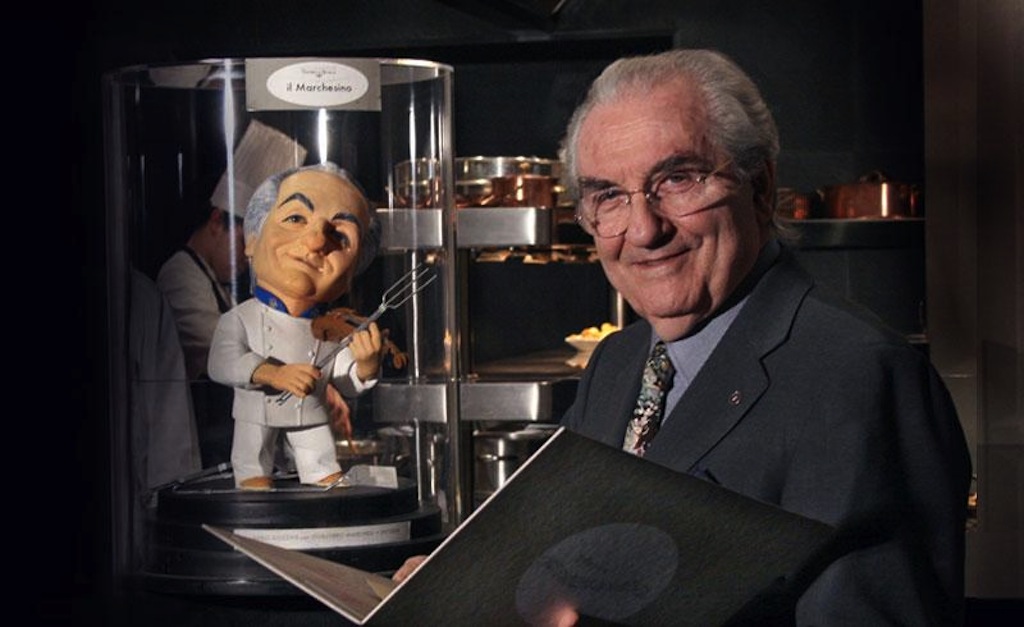Gualtiero Marchesi: The ten commandments of cooking

In an era of competitive cooking shows, where the term “chef” is overused, Gualtiero Marchesi, the Master of Italian Cooking, seeks to restore the word “cook”, a word that represents a profession, and that merits being used with care and respect.
Following the recent controversies regarding TV talent shows, as well as the ongoing debate on the relationship between traditional recipes and creativity, Gualtiero Marchesi, the Master of Italian Cooking, previews, for Expo Milano 2015, his Ten Commandments of Cooking, which are the fruit of much thought, and are based on respect, culture and common sense, in other words, the perfect ingredients.
These Ten Commandments were shared with the Advisory Committee of the Gualtiero Marchesi Foundation, which is made up of leading figures from the world of culture and the arts: Antonio Ballista (pianist), Mario Botta (architect), Giacomo Manzoni (composer), Massimo Montanari (food historian), Davide Rampello (curator of Expo’s Pavilion Zero), Nicola Salvatore (artist), Andrée Ruth Shammah (theater director), Aldo Spoldi (artist), Aldo Colonetti (philosopher and historian of design), and Salvatore Veca (philosopher and curator of Laboratorio Expo).
1. Cooking is a craft or better still, a service. It’s a ministerium.
2. The white uniform possesses the essential characteristics of its function: honesty, cleanliness, and respect.
3. The cook’s law is the recipe that he or she is executing, bearing in mind that every good execution implies a certain amount of interpretation, finely calibrated, neither too much or too little, introduced with reverent discretion. One step up, comes the “composer”.
4. Depending on a cook’s degree of knowledge and experience, he or she is one of three possible types: the executor, the interpreter, and the composer. To reach this level, a cook must first master the technique, and then gain experience in all the relevant areas: appetizers, first courses, meat, fish, and pastry, even if they then decide to specialize in just one.
5. Contributing greatly to the cook’s experience is a knowledge of place: the water, the soil, the air that conserve a memory of that place, conferring substance and taste to its fruits and animals, as well as an acquaintance with inhabitants and climate, with which both must inevitably interact.
6. The study of other countries’ food cultures can help a cook broaden his or her knowledge of the culinary arts, and the approach to recipes, conjuring a different appearance and employing different ingredients.
7. A cook’s skill rests on two pillars: knowledge of raw materials, and how to handle them, respecting their nature.
8. Technical solutions and virtuosity are only possible in the context of knowledge of technique and raw materials, both in the conception and in the execution phases. Technique means the appropriate, controlled, and non-destructive use of the most suitable utensils for the task in hand, without destroying the raw materials in question.
9. For each dish, the cook must know precisely what to do: cooking times, and methods, the exact temperature and, where necessary, the resting periods, since these are also important, much like a pause or a silence in music. Final presentation depends largely on the choice of the most suitable serving dish.
10. One of the tasks that does credit to a good cook, is spreading and increasing knowledge and awareness of the culture of good food. He or she can do this by teaching good eating habits via the food that is served, as well as by training the young recruits, and handing over the reins to those who deserve it, introducing them to the culture of food which, in its finest manifestation, is a truly conscious experience, as well as being a striving for constant improvement, that is then adapted to a real-world context.
And finally, a reminder: Creating is not copying. Which doesn’t mean a pursuit of the new or the “never seen before” for its own sake. We can find innovation in the known just as easily as in the unknown. The key is that it achieves the truth.
Truth in motion becomes art.
Gualtiero Marchesi
